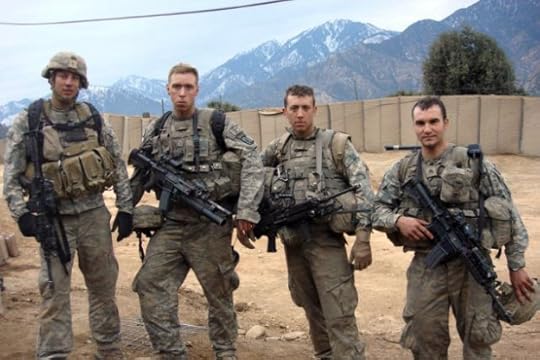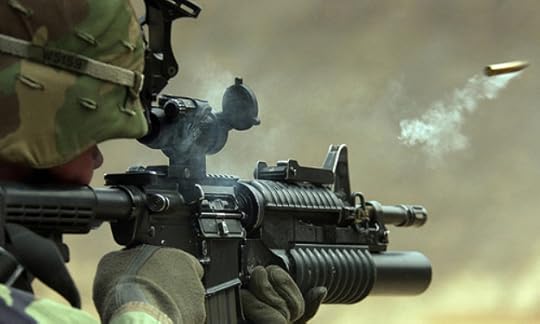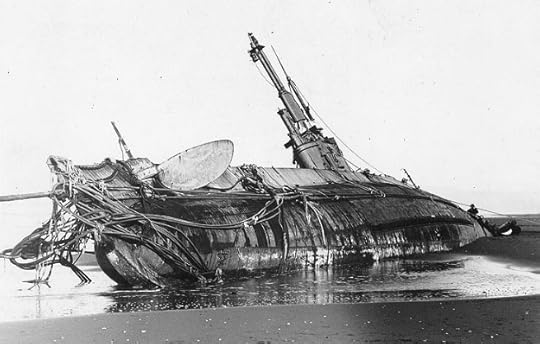Thomas E. Ricks's Blog, page 235
September 6, 2011
A few words about military retirement 'reform' and social class in America

By Robert L. Goldich
Best Defense director of military personnel issues
Lately there has been more of the periodic talk that has
gone on since shortly after World War II about the need to "reform" the
military retirement system -- i.e., cut its costs by cutting the amount of
money paid to retirees. It's interesting to note that of the dozens of study
groups, commissions, committees, boards, task forces, and the like that have
recommended making major structural cuts, only one such has been enacted into
law, in 1986 -- and that was essentially repealed (i.e., its cuts made
voluntary) in 1999, seven years before it would become effective. That alone
says something.
There are lots of reasons to be against changing the basic
paradigm for military retirement: allowing servicemembers to retire at the
20-year mark and immediately begin receiving retired pay, regardless of age,
amounting to 50 percent of high-three-year-average basic pay (NOT total cash
compensation), which usually means about 35 percent of the high-three
computation base. But one that has not been talked about much is the way in
which social class, which tends to be verboten in these here egalitarian, straight-talkin',
straight-shootin' United States, is rearing its ugly head in all of this talk
about retirement "reform." It's simply this: these retirement cuts are designed
by study groups that are officer-centric, for audiences and relevant players
who are primarily officers, and who speak almost always to officer retention. The
"typical" retiree mentioned is always an officer in grade O-5, lieutenant
colonel or Navy commander.
Well, the average retiree is NOT an officer. He or she is an
NCO, in pay grade E-7, an Army sergeant first class; Navy chief petty officer;
Marine gunnery sergeant, or Air Force technical sergeant. Now the life of an
NCO in our armed forces is damned hard when compared to officers, particularly
in the Army, Marine Corps, and the seagoing Navy. First of all, justifiably,
they make a lot less money, and live in less elaborate quarters. All fine and
good: those with more responsibility have always made more money than those
with less. They move just as often as officers, but have lesser moving
allowances. Perhaps most importantly, officers have breaks in 24/7,
hard-driving assignments to line units or on board ship; they go to schools
that are almost a year long; they get staff jobs at the Pentagon or elsewhere;
they get more desk jobs in larger unit headquarters than NCOs. NCOs have few
such breaks. After 20 years, even in
their late 30s (assuming they enlisted in their late teens), they are often
physically and mentally worn out. And when they do get their retired pay, of
course, it is 50 percent of high-3 basic pay and 35 percent of total cash
compensation that is much less than that of officer retirees.
Our NCO corps knows all this. They are also the jewel in our
military crown. A retired colonel friend of mine correctly pointed out that
many of our NCOs wouldn't just be officers, or majors or lieutenant colonels in
other armies -- they would be generals. Right now they stick around for 20
years because they know that the pot of gold at the end of the 20-year rainbow
will be substantial and enable them to start a second career -- which they have
to have, given that kids will be going to college and few men or women can
actually live on military retired pay alone. Twenty-year retirement makes up
with power what it lacks in subtlety. If we take it away as it stands, our NCO
corps will hemorrhage. They will see correctly that the American people think
their careers are no different than civilians who have an infinitely easier
life. And one of the key factors in making our armed forces as outstanding as
they are will be greatly damaged. The people who want to savage the current
military retirement system are displaying appalling ignorance of the psychology
and outlook of our sergeants and petty officers.
In 1895 Rudyard Kipling, in his poem The 'eathen, wrote that "the backbone of the
Army is the Non-commissioned Man." Too bad that the businesspeople and
quantitative analysts and managerialists, and some military officers, are
supporting actions that would break that spine.
Robert
L. Goldich retired from the Congressional Research Service in 2005 as its
senior military manpower analyst. Currently he is consulting and writing a book
on the history of conscription.
While no one is looking, Obama is doing quite well in foreign policy

David Ignatius, for my money the best foreign policy
columnist working today, makes a
good argument that President Obama has been very successful in foreign
policy. "There have been a lot of bumps and bruises, especially in the global
economy. But if you step back from the daily squawk box, some trends are clear:
Alliances are stronger, the United States is (somewhat) less bogged down in
foreign wars, Iran is weaker, the Arab world is less hostile and al-Qaeda is on
the run."
Navy: Unlike that stick-in-the-mud Army, we cool with Five Finger shoes

Unlike
the Army, as they say.
UNCLAS //N01000//
NAVADMIN 238/11
MSGID/GENADMIN/CNO WASHINGTON DC/N1/AUG//
SUBJ/MINIMALIST FOOTWEAR//
REF/A/DOC/NAVPERS 156651/01JAN03//
AMPN/REF A IS NAVY UNIFORM REGULATIONS//
RMKS/1. THIS NAVADMIN AUTHORIZES THE WEARING OF MINIMALIST FOOTWEAR WITH THE
NAVY PHYSICAL TRAINING UNIFORM (PTU) DURING COMMAND/UNITDIRECTED PHYSICAL
TRAINING (PT), INDIVIDUAL PT, AND ACTIVITIES TO INCLUDE THE SEMI-ANNUAL
PHYSICAL READINESS TEST (PRT).
2. MINIMALIST FOOTWEAR IS DEFINED AS SHOES THAT ALLOW THE FOOT TO FUNCTION
NATURALLY WITHOUT PROVIDING ADDITIONAL SUPPORT OR CUSHIONING. ANY SHOE THAT IS
MARKETED AS MINIMALIST OR BAREFOOT-LIKE FOOTWEAR (CURRENT TYPES SUCH AS THE -
VIBRAM FIVE FINGERS, NIKE FREE SHOES, VIVO BAREFOOT SHOES, INOV-8 SHOE, AND
FEELMAX) ARE AUTHORIZED FOR WEAR WITH THE PTU.
(Tip of the BD hat
to J "Jet Fuel" P)
September 2, 2011
Cheney's basically honest memoir

I know, I never expected to write that headline. But I have
to give credit where it is due. I found former Vice
President Cheney's memoir generally to be honest, and also better written
than many similar books.
I had expected it to be a blamefest like other the memoirs
of other Bush Administration hardliners, such as those by Donald Rumsfeld,
Douglas Feith and Tommy R. Franks, that throw out a lot of accusations, but
rarely face up to their own mistakes. But Cheney addresses many of the problems
and embarrassments of his life. He is clear-sighted about the failures of the
1991 Gulf War, writing that Saddam Hussein "was able to turn the fact that he
had stood up to and survived a massive assault into a personal victory." (P.
224) He explains why he thought it necessary to take a moment on the Senate
floor to tell Sen. Patrick Leahy to go fuck himself. He even walks us through
how he happened to shoot a hunting buddy, and touches repeatedly on his two
drunk driving arrests as a youth.
A big exception to the tone of reasonable self-examination
is his treatment of his speech to the VFW Convention in August 2002, an event I
consider to be as close as we came to having a declaration of war against Iraq.
He discusses his speech, but skips its most memorable line, his argument-ending
assertion that, "Simply stated, there is no doubt that Saddam Hussein now has
weapons of mass destruction. There is no doubt that he is amassing them to use
against our friends, against our allies, and against us." This would be a far
better and more memorable book if Cheney had seriously pondered how he could
have been so wrong. I am not looking for an abject apology, but had hoped for
at least a meliorative meditation.
(There is a pattern here: The bigger mistake, the less
attention he pays to it. I've noticed this frequently in the military, where
generals get fired for personal indiscretions but not for professional
bumbling. I suggest we call it Yingling's Rule,
for the observation by the lieutenant colonel of that name that nowadays a
private who loses his rifle receives more punishment than a general who loses a
war.)
The real disappointment to me of the book is that it has little of
interest to say about Iraq, and even less about Afghanistan. I get the
impression that everyone in the Bush Administration decided around the fall of
2004 that it was someone else's problem. But again
BD comment of the day: Suicide is killing more combat vets than Iraq is

It didn't take Jim
Gourley long to get back on the board with this powerful observation
about August:
"This was the first month that there were no American combat deaths in
Iraq. So we can say with certainty that more veterans of that war died as a
result of PTSD/depression at home than they did of direct enemy action in
country."
Meanwhile, here is another
vote for marijuana as a PTSD palliative. I wonder if this is what
ultimately may lead to legalization.
Tom's proposed constitutional amendment: BanTexan presidents!

Our nation's two
most wrongheaded wars were launched by Texans. This is not a partisan crack -- LBJ
was a Democrat, and George W. Bush a Republican. But it is a regionalist
crack--the more I listen
to Rick "Lynch
Mob" Perry, the more
I think we may need the following constitutional amendment:
"No citizen of the
state of Texas may be eligible to serve as president of the United States until
five decades have passed since the end of the last war waged by a president
from Texas."
More here from
Abu "Multilateralists R Us" Muqawama.
September 1, 2011
And we're back

For the last month I've been almost as quiet as Clarence
Thomas. No more! And no, I did not give up blogging for
Ramadan.
Let's review the month:
--My condolences
to the families of the
SEALs lost on Aug. 5. Oddly, I think I know the valley where they went down
-- I remember going to a picnic near there in the spring of 1971. We also used
to go skiing about 15 or 20 miles NE of the crash site. Even had a rope tow,
and nice views of the Koh-i-Baba range.
--I'm not fed up with President Obama. I agree with the
observation I saw that he is less reckless than
his political opponents. I don't think he has been given sufficient credit for
that.
--But I am fed up with Obama's
Lincoln imitation. Here he is in Iowa in mid-August: "First of all,
democracy is always a messy business in a big country like this. We're diverse,
got a lot of points of view. We kind of romanticize sometimes what democracy
used to be like. But when you listen to what the Federalists said about the
anti- Federalists and the names that Jefferson called Hamilton and back and
forth -- I mean, those guys were tough. Lincoln, they used to talk about him
almost as bad as they talk about me." Actually, they talked much worse about
Lincoln, and the country was in a much worse situation.
--Nice job wrapping
up the Libyan war. This strikes me as a victory for the Libyan rebels, for NATO
and for Obama. Turned out leading from the rear worked -- the United States
achieved its aim, yet is not on the hook for the aftermath. Let the Libyans
figure it out. Not one American died in this fight, as that is a good thing, in
many ways. Was this Suez
'56 in reverse?
--The Syrian military
may
be showing signs of splitting. It would be nice to see Assad go the way of
Qaddafi. Iran worries about this happening and advises Assad to
lighten up.
--Commentary on the
British youff riots
struck me as a mirror in which everyone blamed it on whatever they didn't like.
Col. Blimp types blamed multiculturalism. (I actually think Europe doesn't have
a multi-culture--we Americans do have one, and it works, generally. The UK and
the Euros simply have societies that generally tolerate the presence of other
minority cultures.) My favorite column blamed the
Americanization of Britain, as if we invented riots.
-If corporations
are people, as candidate
Romney asserts, why can't they be sentenced to jail, like regular people?
Or even executed, like they do in Texas?
--And then there
was this headline of the day:
Liberia's
General Butt Naked seeks redemption
Maybe first, put on
some pants.
Meanwhile, a busy month at the Navy as 4 COs/XOs get the heave-ho -- and what that has to do with Nitze and Zumwalt

I see that the
Navy ousted
the CO of its "Beachmaster Unit 2," of which I never had heard. (No. 16) The
comments of sailors on the Navy Times site ran in support of him, with
several saying he is a good leader and that anyone could be nailed for misuse
of government resources. It reminds me of what the drill instructors on Parris
Island told me: "If you're not breaking the rules you're not doing your job."
And the CO
of Naval
Support Activity Saratoga Springs, New York, was dismissed from his
position after being busted for DWI. For those of you keeping score at home,
that's 17 for the year.
Also, the former XO
of the USS Gettysburg also got the old heave-ho, for sexual
misconduct. Apparently he was facing a choice of court-martial or retirement. The
former XO
of the USS Roosevelt went him one better and got a year's imprisonment
for wrongful sexual contact and such.
And a shipyard
inspector was sentenced to three years for lying
about welds he claimed to have inspected on submarines. It is interesting
to think about making him serve his term aboard the subs he inspected. But that
would "unusual," and perhaps "cruel."
I spent part of my
August reading the crisply written memoirs
of Paul Nitze, who among other things was secretary of the Navy in the
mid-1960s. One day he turned to his aide, Adm. Elmo "Bud" Zumwalt, and
complained about a personnel problem, "Why does this have to happen to me?"
Zumwalt responded aptly that, "If you have more than a million men working for
you, every unpleasant problem that has one chance in a million of occurring
will occur at least once." (P. 254)
Patton: In good odor

Someone came out
with a cologne called "Patton." Slap some on today! This is no
joke, as far as I can tell.
August 25, 2011
Cheney's dreamed Italian exile of 2010

This sounds like the germ of a novel to me -- Dick Cheney
going into exile in Italy:
… in the epilogue, Mr. Cheney writes that after undergoing heart surgery in 2010,
he was unconscious for weeks. During that period, he wrote, he had a prolonged,
vivid dream that he was living in an Italian villa, pacing the stone paths to
get coffee and newspapers.
The former vice president also
discloses that he advocated bombing Syria in 2007.
Thomas E. Ricks's Blog
- Thomas E. Ricks's profile
- 436 followers



